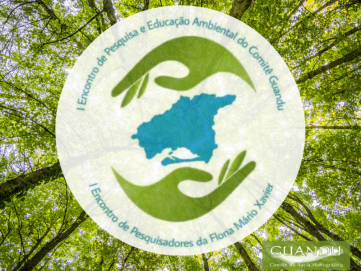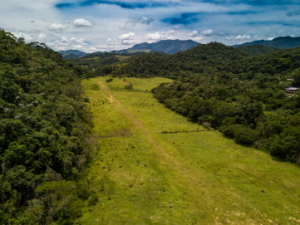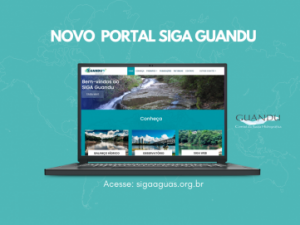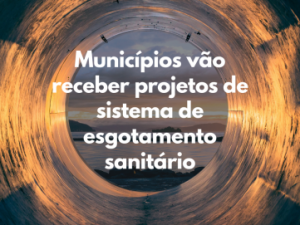More than 500 people have already signed up for the 1st Meeting of Research and Environmental Education of the Guandu Committee and the 1st Meeting of Researchers at Flona Mário Xavier, which will take place simultaneously on an online platform on the 22nd, 23rd and 24th of March. Organized by the Guandu-RJ Committee and the Federal Rural University of Rio de Janeiro (UFRRJ), the meetings aim to encourage social actors in the territory of the Guandu Hydrographic Basin to carry out research actions, offering a space for socio-environmental learning, sharing experiences and integration. The meetings are open to the public who can register for free through the website.
The three-day event will feature the participation of 15 experts, with experience and work throughout Brazil. In addition to debating the themes, the researchers will integrate social actors who work on the fronts of environmental conservation, transforming the event into a platform for learning and exchanging experiences.
In addition to the roundtables, professors, students and researchers from all over Brazil submitted their work until the end of January. Thirty-five were approved by the scientific committee, within the event’s themes, and bring to the agenda the multiple views of environmental education, water scarcity, biodiversity protection and conservation, solid waste management, among others. These are applied research, experience reports and theoretical discussions, which will be published in ebook format for access by the entire community. The presentation of the works will take place in three days, from 2 pm to 5 pm, in virtual rooms, coordinated by the scientific committee. The event’s General coordinator, Dr. Karine Bueno Vargas, professor at the Department of Geography (IA/UFFRJ) and at the Graduate Program in Geography/PPGGEO/UFRRJ, spoke about the participation of the public and researchers: “the proposal from a first event in the Guandu Hydrographic Basin concomitant to a first meeting of researchers from Flona Mário Xavier was very well received by the scientific community, which recognized the importance of a space for discussion and exchange of knowledge and the need to include other social actors that operate in the basin, as the conservation of our natural resources is only effective when Governments and society walk together. Surprisingly, we had works from other regions of Brazil, but we believe that the exchange of experiences and perspectives from other territories will add to the event”.
Roundtable programming also takes place over the three days, from 10 am to noon, on the YouTube channel of the Integrated Laboratory of Applied Physical Geography – LIGA at UFRRJ. On the first day of the event, March 22, World Water Day, the theme will be water resources and Biodiversity in the Guandu basin. The panel will feature the participation of Cleber Marques de Castro, PhD in geography from UFRJ and adjunct professor in the department of geography and in the Postgraduate Program in Geography at UFRRJ; Decio Tubbs Filho, Master in Geosciences (Geochemistry) and adjunct professor at UFRRJ; Claudia Moster, PhD in Applied Ecology and Professor at the Department of Environmental Sciences at the Instituto de Florestas da UFRRJ and; with the mediation of Janaina Vettorazzi, Ph.D. in Animal Biology with expertise in issues involving water quality and water resources management.
On the second day, March 23, the theme will be environmental education. The panel will be composed by Silvana Gontijo, journalist, writer and media educator; Maria Henriqueta Andrade Raymundo, Master in Forest Resources and public manager in the area of sanitation and environmental education and; Agatha Tommasi, Coordinator of Sustainability and Environmental Education at the Secretary of State for Environment and Sustainability – SEAS. The mediation will be by the environmental manager and director of the Guandu-RJ Committee, Marcelo Danilo Bogalhão (ANAGEA/RJ). “I am very happy to participate in this initiative in the education area of the Guandu Committee, which aims to encourage research, teaching and extension actions. Sharing our experiences in this forum is an opportunity and, above all, a privilege”, said Silvana Gontijo, a speaker who will address environmental education.
The third day, March 24, will be dedicated to Flona Mário Xavier, with the theme “A living open-air museum”. Flona is a conservation unit founded in 1986, in the area of the former Horto Florestal de Santa Cruz, located in Seropédica/RJ, with 496 hectares that are home to endemic species of fauna. The table will feature the master in Geography and head responsible for Flona Mário Xavier, Ricardo Nogueira; biologist Gustavo Henrique Soares Guedes, researcher at the Fish Ecology Laboratory (LEP-UFRRJ) and; Sergio Potsch, PhD in Biological Sciences and professor at UFRRJ. The mediation will be by the coordinator of the meeting, professor Karine Bueno Vargas.
Remembering that registration is open and can still be made for free on the event’s website. The same
address you can check the list of approved works.
Service:
I Meeting of Research and Environmental Education of the Guandu Committee and I Meeting of Researchers at Flona Mário Xavier.
March 22nd, 23rd and 24th.
Registration is free and open on the event website: https://www.even3.com.br/flonamxguandu/
The roundtable schedule will be broadcast on the Integrated Laboratory of Applied Physical Geography YouTube channel: http://bit.ly/3e9oRiD
Further information can be made by email: gcflonamarioxavier@gmail.com.
COMMUNICATION GUANDU COMMITTEE
Telephone: (21) 3787 3729
E mail: comunicacao.guandu@agevap.org.br




